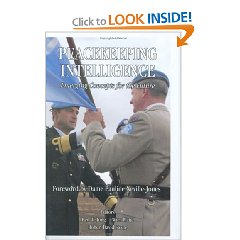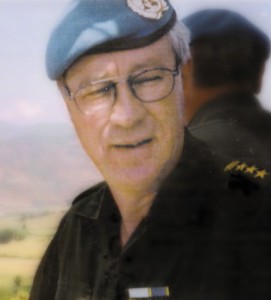Wies Platje is a retired lieutenant commander of the Royal Netherlands Navy. For over thirty years he held various functions within the Netherlands Navy Intelligence Service. He is a member of the NISA Board and one the organisers of the NISA/IDL International conference on Peacekeeping and Intelligence in November 2002 in The Hague, and subsequently one of the Editors of the first book devoted to this topic. He is the author of a book about the Netherlands Navy Intelligence Service, published in 1997 and one of the contributors to Secrets of Signals Intelligence during the Cold War and Beyond (London: Frank Cass Publishers 2001).
Who’s Who in Peace Intelligence: David Ramsbotham
Alpha Q-U, Peace IntelligenceSir David Ramsbotham is General (Ret.), British Army, and has served as a consultant to the UN on peacekeeping issues in Cambodia, Cyprus, Israel, Lebanon, Somalia, and Yugoslavia. Apart from his Army experience, rising to Adjutant General (number two on the Army Board, responsible for personnel and training) he has spent three years in the private sector dealing with UN and World Bank post-conflict resolution and de-mining challenges, and was HM Chief Inspector of Prisons from 1995-2000. Today he is a Fellow at Corpus Christi College within Cambridge University and continues to take an interest in peacekeeping intelligence matters.
Analysis and Assessment for Peacekeeping Operations

Who’s Who in Peace Intelligence: Martin Rudner
Alpha Q-U, Peace IntelligenceMartin Rudner is a Professor at The Norman Paterson School of International Affairs, Carleton University, Ottawa, and founding Director of the Canadian Centre of Intelligence and Security Studies at Carleton. Born in Montreal,
Quebec, he was educated at McGill University, the University of Oxford, and at the Hebrew University of Jerusalem, where he received his doctorate. Professor Rudner taught at the Hebrew University, and was at the Australian
National University in Canberra before coming to Carleton. He is author of over sixty books and scholarly articles dealing with international affairs, including articles in Intelligence and National Security and International
Journal of Intelligence and Counterintelligence. Professor Rudner is a commentator and analyst on international security affairs for Canadian and international electronic and print media. He is Past President of the Canadian Association for Security and Intelligence Studies (CASIS).
Canada, the UN, NATO, and Peacekeeping Intelligence

Who’s Who in Peace Intelligence: Hugh Smith
Alpha Q-U, Peace IntelligenceHugh Smith is a Senior Lecturer in the Department of Politics, University College (UNSW), Australian Defence Force Academy, New South Wales, and was the Founding Director of the Australian Defence Studies Centre at the Academy. His work below was a pioneering endeavor.
Intelligence and UN Peacekeeping

Who’s Who in Peace Intelligence: Shlomo Sphiro
Alpha Q-U, Peace IntelligenceShlomo Sphiro is a lecturer at the Department of Political Studies and a Fellow of the BESA Centre for Strategic Studies at Bar-Ilan University in Israel. He specialises in intelligence, security, communications and media. Previously he has conducted research and taught at universities in Britain and Germany, and led a NATO project on improving intelligence co-operation with Mediterranean countries.
Intelligence, Peacekeeping, and Peacemaking in the Middle East

Who’s Who in Public Intelligence: Robert David STEELE Vivas
Alpha Q-U, Public IntelligenceRobert David Steele (Vivas) is the founder of OSS.NET, a web site dedicated to international intelligence reform including improved use of open source intelligence (OSINT). He has served in three of the four directorates of the Central Intelligence Agency, as a clandestine case officer, an all-source requirements and collection manager, and as project leader for advanced information technology applications. He was the senior civilian responsible for founding the Marine Corps Intelligence Command. Mr. Steele holds a BA in Political Science with a thesis on multinational corporation operations and home-host country issues; an MA in International Relations from Lehigh University with a thesis on predicting revolutions; and an MBA in Public Administration from the University of Oklahoma with a thesis on strategic and tactical information management for national security. He is a distinguished graduate of the Naval War College, and has earned a certificate in Intelligence Policy from Harvard University. Mr. Steele is the author of On Intelligence: Spies and Secrecy in an Open World (AFCEA International Press 2000 and OSS International Press 2002) and The New Craft of Intelligence: Personal, Public, & Political (OSS International Press 2002) as well as many monographs, chapters, and articles on information and intelligence strategy and operations. He is the ranking reviewer on Amazon for non-fiction books about national security, information, intelligence, and related ethical issues. Reach him at robert.david.steele.vivas@gmail.com.
Who’s Who in Peace Intelligence: Jan-Inge Svensson
Alpha Q-U, Peace Intelligence
Jan-Inge Svensson is a colonel (now retired) in the Royal Swedish Army. In 2002 he was the Commanding officer of the Swedish Armed Forces Intelligence and Security Centre. In 1995 he was Head of the G-2 section (intelligence) of the United Nations Protection Force (UNPROFOR) in Zagreb. In 1996 he developed and implemented a Swedish National Intelligence Cell in Sarajevo. Since retirement he has been the lead Course Director and strategic planner for Multinational Information Sharing and Sense-Making at the Folke Bernadette Academy, and is among those in the senior ranks of the Nordic countries who have been asked to create the United Nations Peacekeeping Intelligence curriculum. He is also the Editor of the follow-on book, INTELLIGENCE FOR PEACE: Multinational, Multifunctional Information-Sharing and Sense-Making [free online].
Peacekeeping and Intelligence Experiences from United Nations Protection Force 1995


